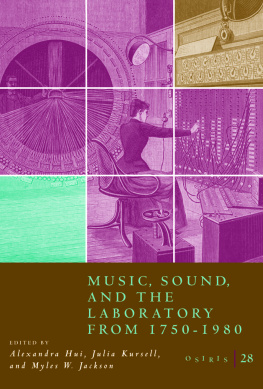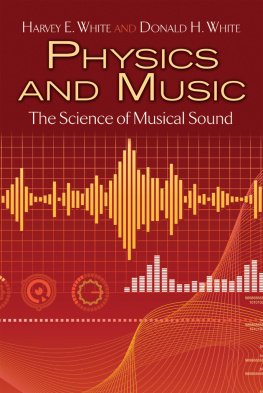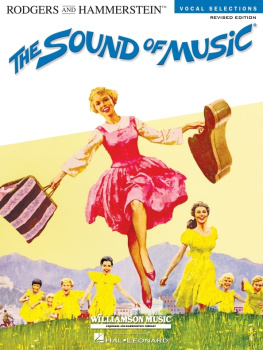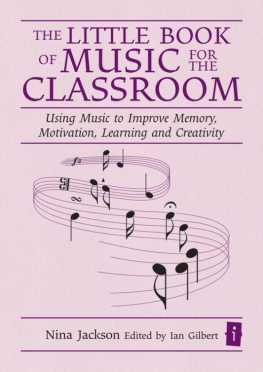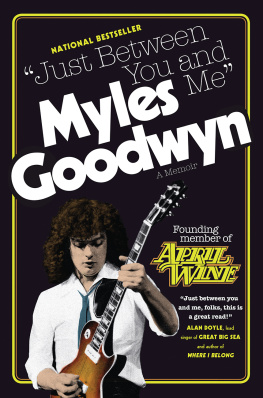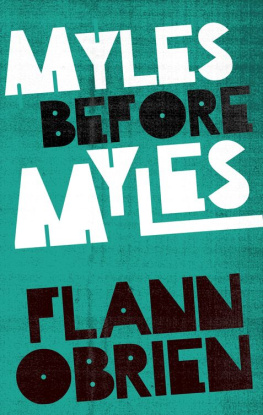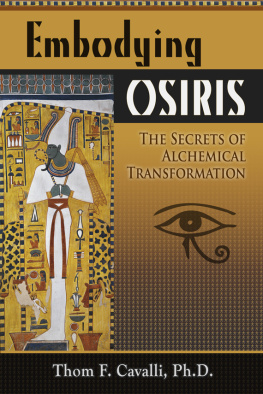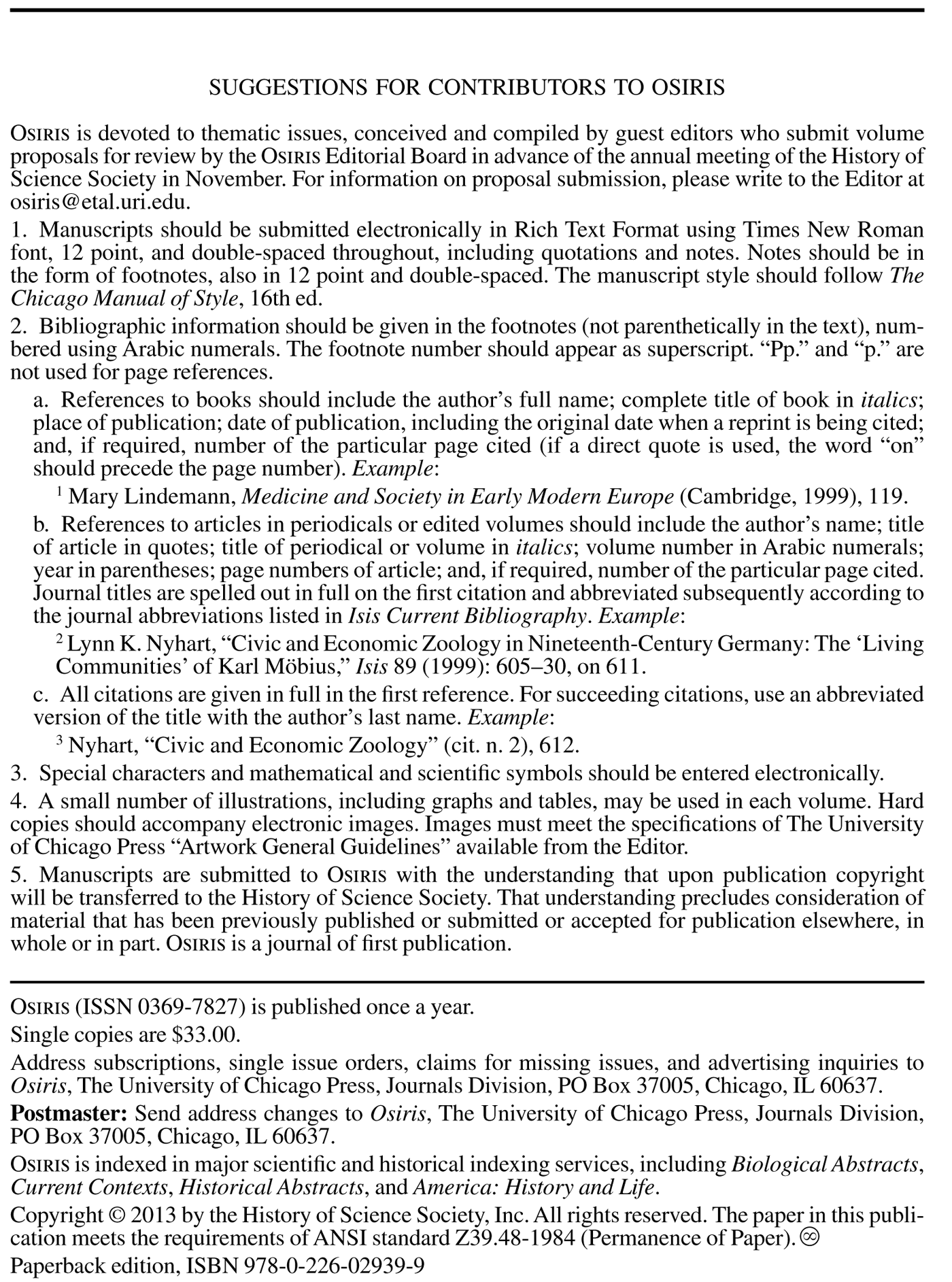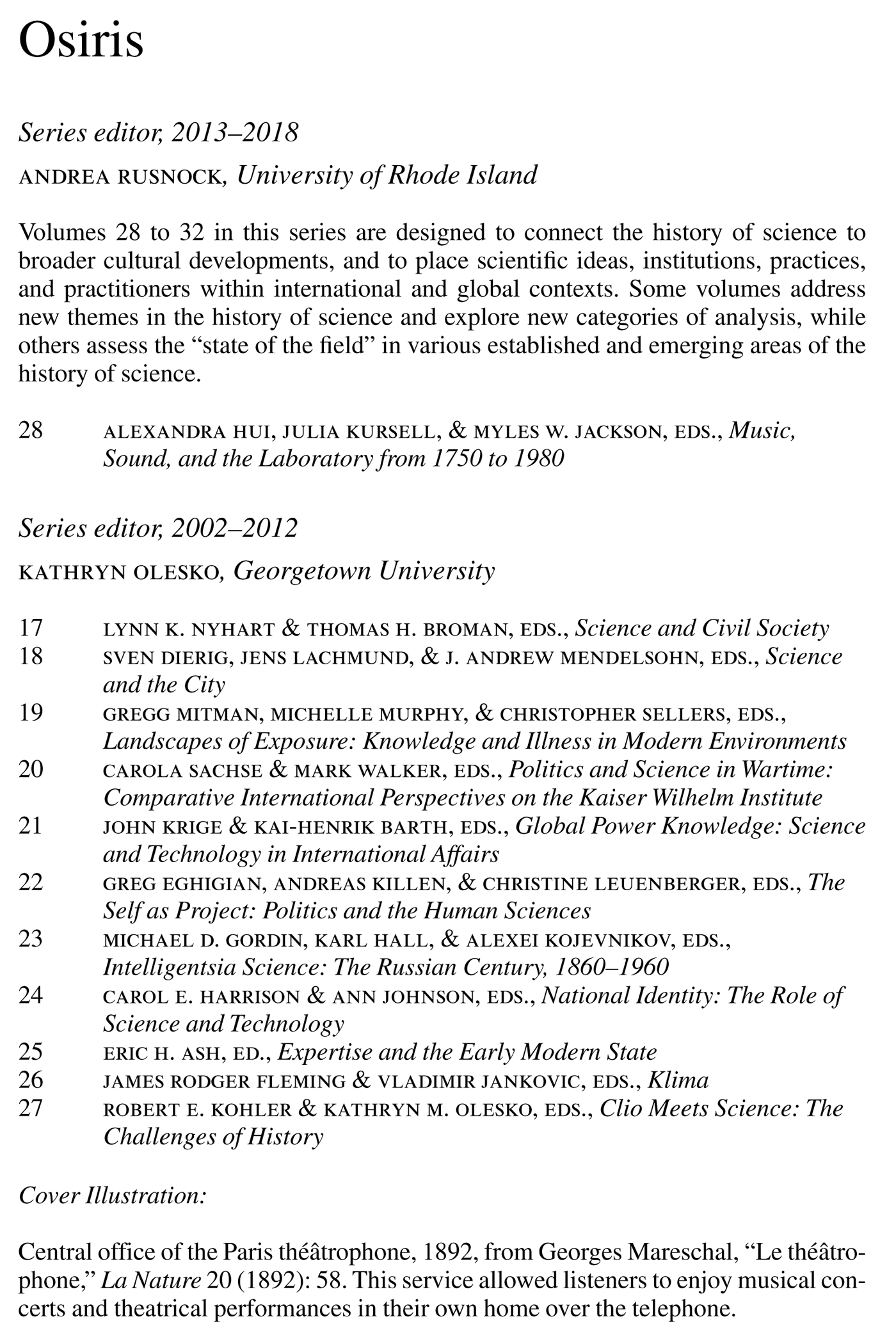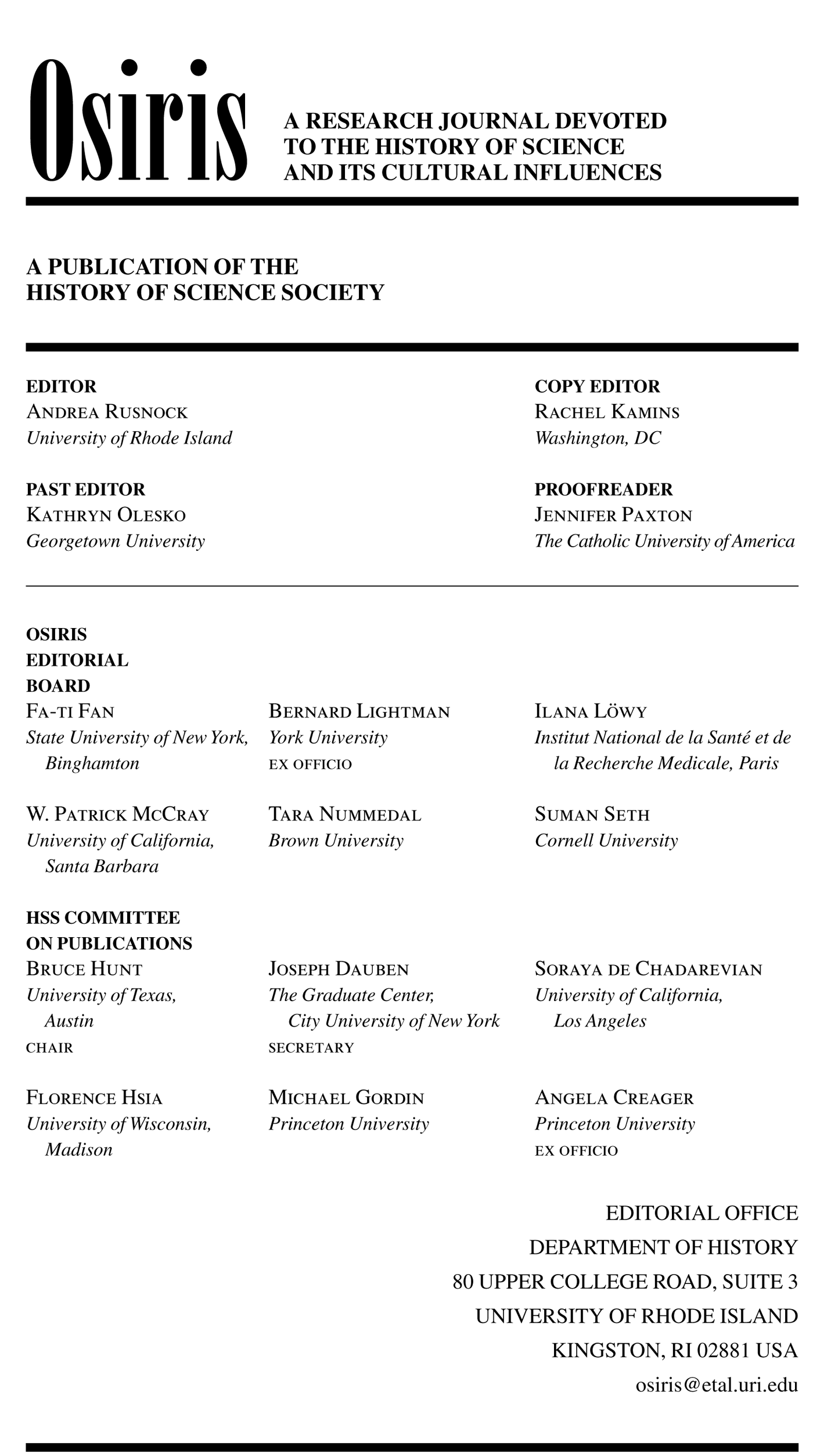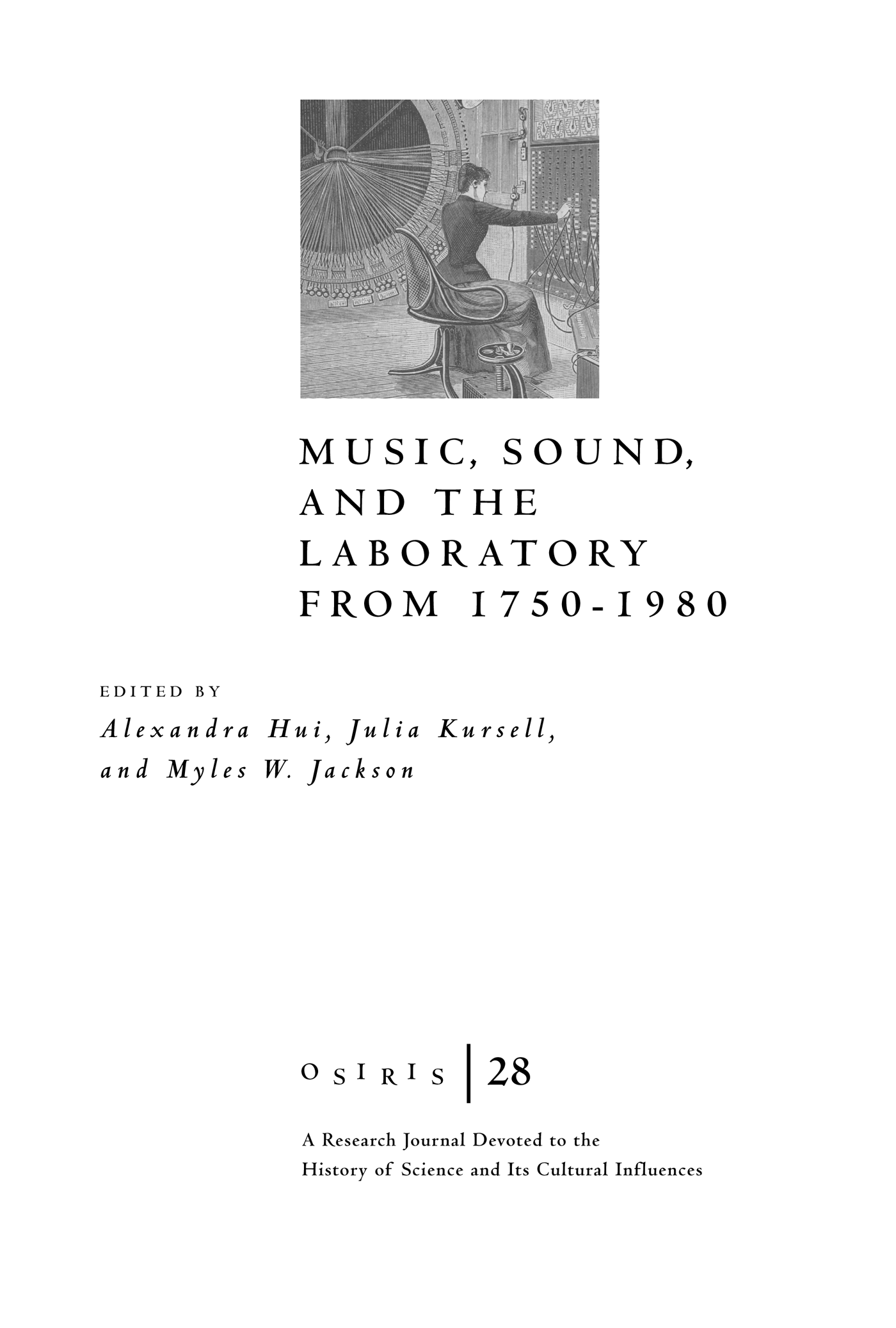| OSIRIS 2013 | SECOND SERIES VOLUME 28 |
Introduction
Alexandra Hui, Julia Kursell, and Myles W. Jackson:
Techniques of Evidence
Peter Pesic:
Roland Wittje:
Daniel Gethmann:
Axel Volmar:
Phenomenotechnique of Sound
Bernhard Siegert:
Alexandra Hui:
Armin Schfer:
Henning Schmidgen:
Circulation of Sound Objects
Julia Kursell:
Sonja Petersen:
Elfrieda Hiebert:
Cyrus C. M. Mody and Andrew J. Nelson:
John Tresch and Emily I. Dolan:
OSIRIS 2013, 28 : 299300
Notes on Contributors
Emily I. Dolan is Associate Professor of Music at the University of Pennsylvania. Her first book, The Orchestral Revolution: Haydn and the Technologies of Timbre (Cambridge, 2013), explored the birth of a new form of attention to sonority, uncovering the intimate relationship between the development of modern musical aesthetics and the emergence of orchestration. She is currently working on a project on the instrumentality of music that delves into ideas of instrument invention and classification, historiography, and the birth of modern organology.
Daniel Gethmann is Assistant Professor at the Institute of Architectural Theory, History of Art, and Cultural Studies at Graz University of Technology. His research focuses on the fields of auditory culture, media theory, and the history and theory of cultural techniques. He is the author of Das Narvik-Projekt: Film und Krieg (Bonn, 1998) and Die bertragung der Stimme: Vorund Frhgeschichte des Sprechens im Radio (Zurich, 2006).
Elfrieda Hiebert (19212012) was Director of the Chamber Music Program at Mather House, Harvard University, from 1976 to 2005. She also taught piano to Harvard students and continued coaching chamber music until 2009. As a Fred Fellow at the University of WisconsinMadison, she was awarded a PhD in Musicology with an additional concentration in chamber music performance mentored by Eva Badura-Skoda and Rudolf Kolisch.
Julia Kursell is Professor of Historical Musicology at the University of Amsterdam. She previously worked as a research scholar at the Max Planck Institute for the History of Science, Berlin. She is the author of Schallkunst: Eine Literaturgeschichte der Musik in der russischen Avantgarde (Vienna, 2003) as well as numerous articles on the history of the auditory physiology and psychology of music, the history of auditory media, and twentieth-century composition. Currently, she is completing a book manuscript on Hermann von Helmholtzs experimental musicology.
Cyrus C. M. Mody is Assistant Professor of History at Rice University. His first book is Instrumental Community: Probe Microscopy and the Path to Nanotechnology (Cambridge, Mass., 2011). He is currently working on a second monograph, The Long Arm of Moores Law: Microelectronics and American Science, 19652005.
Andrew Nelson is Assistant Professor of Management and Bramsen Faculty Fellow in Innovation, Entrepreneurship, and Sustainability at the University of Oregon. He received his PhD from Stanford. His research focuses on the diffusion and commercialization of university-based research in computer music, green chemistry, and biotechnology.
Peter Pesic is Tutor and Musician in Residence at St. Johns College in Santa Fe, New Mexico. He is the author of several books, including Abels Proof: An Essay on the Sources and Meaning of Mathematical Unsolvability (Cambridge, Mass., 2003), and Sky in a Bottle (Cambridge, Mass., 2005), and has edited works by Planck, Maxwell, Gauss, and Weyl for Dover Publications and Princeton University Press. He has been awarded the Peano Prize and is a Fellow of the American Association for the Advancement of Science and of the American Physical Society, as well as a Guggenheim Fellow.
Sonja Petersen is Academic Researcher and Teacher in the Department of History, Section for the History of the Impact of Technology, University of Stuttgart. She received her PhD in 2010 in History of Technology at Darmstadt University of Technology and worked from 2010 to 2011 as Guest and Visiting Professor in the Department of Product Design at the Offenbach Academy of Art and Design. Her current research interests are the history of private energy consumption and the meaning of writing and drawing in the creation and acquisition of knowledge.
Armin Schfer is Professor of German Literature and History of Media Culture in the Department of Cultural and Social Sciences at the University of Hagen.
Henning Schmidgen is Professor of Media Aesthetics at the University of Regensburg, Germany. He just finished a comprehensive account of physiological and psychological time experiments in the nineteenth and early twentieth centuries. His recent books include Die Helmholtz-Kurven: Auf der Spur der verlorenen Zeit (Berlin, 2009) and Bruno Latour: Zur Einfhrung (Hamburg, 2011).
Bernhard Siegert is Gerd Bucerius Professor for the History and Theory of Cultural Techniques at Bauhaus University, Weimar, Germany, and, since 2008, one of the two directors of the International Research Center for Cultural Technologies and Media Philosophy in Weimar. He has published numerous books and articles in the fields of literary studies, media theory and media history, the history of science, and art history, and is coeditor of the Archiv fr Mediengeschichte and the international journal Zeitschrift fr Medien- und Kulturforschung.
John Tresch is Associate Professor in History and Sociology of Science at the University of Pennsylvania. His book The Romantic Machine: Utopian Science and Technology after Napoleon (Chicago, 2012) showed how new devices associated with steam, electricity, light, and life were woven into projects for reorganizing both society and the cosmos in the years before the Revolution of 1848. He is currently working on a book on nineteenth-century American science and the inventions and discoveries of the author and West Pointtrained engineer Edgar Allan Poe.
Axel Volmar is Postdoctoral Research and Teaching Fellow in the Department for Media Studies at Siegen University, Germany. He recently finished his doctoral dissertation, which reconstructs the auditory culture of science since 1800. Volmar has published various articles in the history of science, sound studies, and media studies, and is the editor and coeditor of several collected volumes on auditory culture and the temporality of media technologies, including Zeitkritische Medien (Berlin, 2009), Das geschulte Ohr: Eine Kulturgeschichte der Sonifikation (with Andi Schoon; Bielefeld, 2012), and Auditive Medienkulturen: Techniken des Hrens und Praktiken der Klanggestaltung (with Jens Schrter; Bielefeld, forthcoming).
Roland Wittje is Lecturer in History of Science at the University of Regensburg, Germany. He has published on the history of nineteenth- and twentieth-century physics, including nuclear physics in Norway, the history of teaching science, and university heritage, and is coeditor of Learning by Doing: Experiments and Instruments in the History of Science Teaching
Next page
